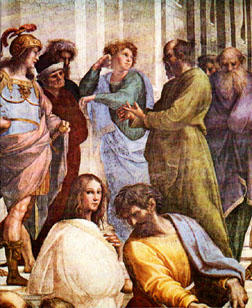The Education of Desire

Education is usually considered as the imparting of information, theories, and methods of inquiry by a mature mind to a less fully formed mind. But there is more to it than that. Anything that inspires new desires in us is also a form of education. After all, we were not born with our current wishes already formed; they have come to us over time — almost invariably through social interactions.
To be sure, your body has certain biological needs and develops new ones throughout the life cycle, as for example when sexual desires emerged at puberty. However, you had to learn to enjoy most things, such as olives and strong coffee. Other people educated your desires. Here I want to explore the experience of learning desires.
Throughout his career, the anthropologist and literary critic René Girard has revealed the anti-social implications of imitative desiring. Most people deny his insights, preferring to believe themselves the source of their own wishes. Yet Girard has shown that we sometimes identify with another person who possesses what we find ourselves sorely lacking and, full of envy and admiration, we emulate him — even his desires. We must then compete against him for the scarce objects that we both want. In this way, conflicts arise that would be unnecessary if our motives had not been acquired vicariously. Our vainglorious cravings often have negative consequences, including collective social phenomena that range from wars to stock market crashes to fads and fashions.
What I want to point out here is the similarity between Girard’s pessimistic account of how we acquire tastes and Socrates’s upbeat interpretation in Plato’s The Symposium.
Like Girard, Socrates points out that the only thing we ever desire is something that we feel that we lack. Our awareness of this lack arises in an emotional relationship with another person — initially usually a beloved whom we desire for his beauty. Our desire is far from regrettable, however, since it stirs in us a new appreciation of beauty and an urge to fill up what is absent in ourselves. According to Plato, a wonderful growth begins with our physical attraction to someone whom we may regard as a lost “other half” of our self – a part that previously we had not realized was missing,
Through this emotional relationship, our love educates us, making us wiser by leading us into higher kinds of awareness, as we recognize progressively higher levels of beauty. Ultimately, we discover that we what we love is not an individual, but rather beauty itself. To Plato, this experience educates our desires and elevates our spirit.
What I want to point out is that our feelings are the basis for this kind of education. Education involves more than verbal communications or mathematical proofs of factual truths. The heart can be educated too. Our cultivation of higher desires and motivations is an emotional transaction involving intimate sentiments. As described by Plato, our emulation of a significant other educates our desires, disciplines our hearts, and deepens our souls — quite a different outcome from the violence and competitiveness that Girard saw and deplored.
But in fact, both outcomes are possible. When we see another person enjoying what we ourselves seem to lack, our vicarious sharing of his motivations may educate our desires and enhance our capacities. Or, conversely, it may mis-educate our desires, make our hearts envious, and brutalize our souls. Either way, the education is emotional, not intellectual, and it involves an absence in oneself of something that can be filled only by what another person possesses.
I want to emphasize here the huge significance of our vicarious preoccupation with other persons’ lives. It shows both how we grow and how our personalities can be stunted. And, oddly, these vicarious involvements can immensely powerful even when the object of our admiration does not know we exist, or is even fictitious. People fall in love with celebrities they have never met, or with characters in novels and plays. Each such passion may either educate our desires or confirm our wretched lacks.
Entertainment is no trivial matter, for entertainers are among the most impressive — and hence influential — persons alive.



0 Comments:
Post a Comment
<< Home